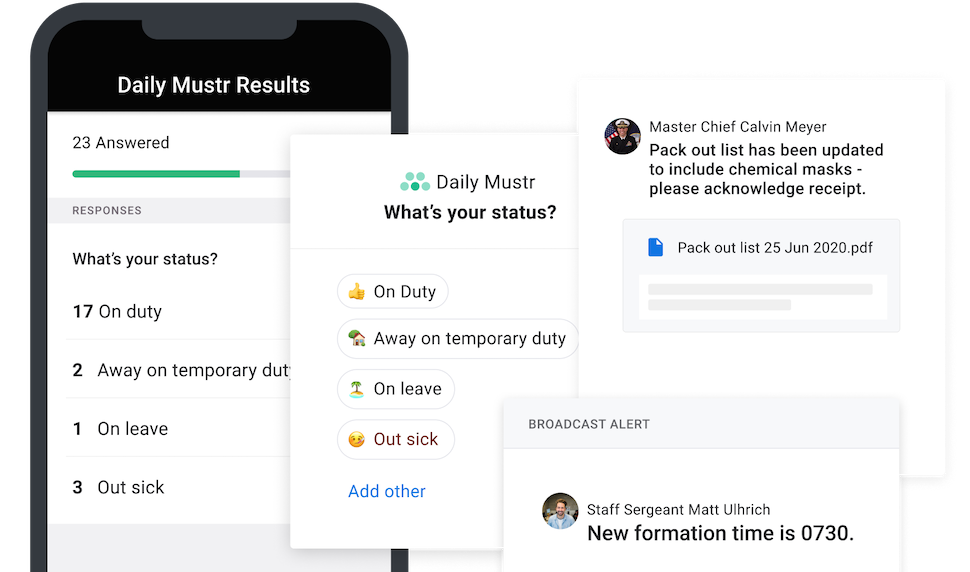From commanding officers to soldiers on the ground, the U.S. military needs a way to ensure mission readiness, duty status, and more. Today Dallas-based Adyton launched its Mustr app, a new accountability tool it hopes will “transform the Department of Defense into a twenty-first century, mobile-enabled organization.”
Adyton says their “mobile technology with a mission” is revolutionizing how critical-skill teams operate. The company was founded in 2018 by two U.S. Army special forces veterans, President JJ Wilson and CEO James Boyd.
“The Adyton Mustr platform will bring a new level of agility and security to universal DoD workflows—enabling distributed organizations not only to maintain accountability of their personnel but also to rapidly gather information and generate data that can be used to support leadership decisions,” Boyd said in a statement.

The Adyton Mustr app [Image: Adyton]
A tool for the military can also help organizations
Mustr helps the military manage distributed personnel from any desktop or mobile device. Its built-in communications tools, automated data collection, and flexible deployment model were designed for the military—but can also be put to use in organizations of all sizes, Adyton says.
“We empower organization leaders—from the lowest first-line supervisor to the commanding officer of a unit—to pull actionable, accountable information from their personnel in real time,” Wilson said in a statement, “which in turn generates structured data that’s not only tied back to the individual service member but also automatically aggregated at the unit level.”
The DoD is the largest employer on earth
In 2015, the World Economic Forum named the U.S. Department of Defense the largest employer on earth, with 3.2 million employees on its payroll. And since 9/11, nearly 3 million U.S. service members have deployed overseas to support military operations.
That gives you an idea of the management and logistics headaches that vibrate from the Pentagon on down—and why the right accountability tool could become a killer app.
“Our service members already have some of the most difficult jobs in the world, and a backlog of monotonous paperwork and antiquated technology only make those jobs harder,” said Garry Tan, co-founder of Initialized Capital, an investor in Adyton, in the statement. “We’re excited to support Adyton as they push the Department of Defense into the 21st century. Mustr will streamline how the largest employer in the world operates, compounding efficiencies with software.”
National Guard conference demonstrates workflow need
Last month, Adyton’s team participated in the National Guard Association’s 2021 Annual Conference in Las Vegas. WIth general officers strolling through exhibits from 300 organizations, it was a target-rich environment for Adyton to demonstrate Mustr’s capabilities.
One general officer told Boyd, “I don’t know anything about all this digital, mobile stuff—but I know it’s my only chance to reach my people.”
Boyd wrote in a LinkedIn post about the conference that the National Guard is exhibit A for the defense department’s need for accountability solutions.
Guard leadership has “long had to navigate the challenges associated with a remote workforce and limited access to enterprise systems,” Boyd wrote. “According to an O6 from the Air National Guard, ‘Most of my people don’t even have access to a computer 90 percent of the time—much less a CAC card reader—and we can’t use drill weekends to catch up on paperwork.”
Every unit member has a “perfectly good computer in their pocket”
“Email is dead,” Boyd quoted a retired U.S. Air Force two-star general, “and we cannot run a professional military organization on text chains, phone trees, and WhatsApp threads. It’s absurd, especially when every single member of the unit is carrying around a perfectly good computer in their pocket.”
Another senior Guard leader told Boyd, “We would grind to a halt without mobile at [my civilian company]—but in the military we’ve either been told that it can’t be done or else we don’t know where to start.”
Obviously, the team at Adyton hope the military starts with Mustr.
Retired general likes what he sees in Mustr
“Working through the patchwork of analog tools is not only frustrating; it’s expensive,” said Maj. Gen. (Ret.) Malcolm Frost, former commanding general at the Center for Initial Military Training. “I’m excited to see Silicon Valley technology and ideas put to use tackling our nagging logistical problems,”
![]()
Get on the list.
Dallas Innovates, every day.
Sign up to keep your eye on what’s new and next in Dallas-Fort Worth, every day.





























